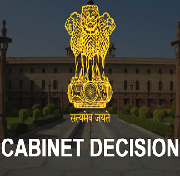CCEA approves revised price of ethanol under EBP for OMCs
The Cabinet Committee on Economic Affairs (CCEA) approved revision in price of ethanol under Ethanol Blended Petrol (EBP) Programme for supply to Public Sector Oil Marketing Companies (OMCs).
The revised price was fixed at Rs. 40.85 per litre under EBP and will be applicable for forthcoming sugar season 2017-18. GST and transportation charges will be payable additionally.
Key Facts
This price was re-examined in context of firming of sugar prices and falling crude prices and consequent under-recoveries of OMCs. The approval will facilitate continued policy of Government in providing price stability and remunerative prices for ethanol suppliers. It will also help in reducing dependency on crude oil imports, saving in foreign exchange and benefits to environment.
Background
The Union Government in December, 2014 had decided to administer price of ethanol under EBP Programme in order to augment supply of ethanol. In pursuance of this, Government had fixed delivered price of ethanol during ethanol supply year 2014-15 & 2015-16 in range of Rs.48.50 to Rs.49.50 per litre including taxes and transportation charges. It has helped to significantly improve supply of ethanol from 38 crore litres during ethanol supply year 2013-14 to 111 crore litres during 2015-16.
Ethanol Blending
It is process of mixing petrol with ethanol. The mixture is called as Ethanol Fuel/Gasohol which is considered as quasi-renewable energy. Ethanol is biofuel derived from Sugarcane molasses (by-product in the conversion of sugarcane to sugar), corn, sorghum etc.
In India, practice of blending ethanol was started in 2001. It was first time mentioned in the Auto fuel policy of 2003. Later, National Policy on Bio-fuels, 2009 made mandatory for oil companies to sell petrol blended with at least 5% of ethanol.
Ethanol Blended Petrol (EBP) Programme
It was launched by Government in 2003 to promote the use of alternative and environment friendly fuels. It has been extended to notified 21 States and 4 UTs. This intervention aims to reduce import dependency for energy requirements and environment friendly measure to reduce vehicular pollution.
Month: Current Affairs - November, 2017


